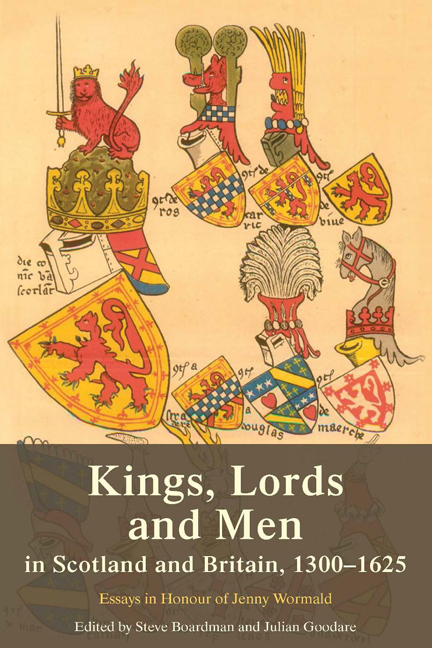Book contents
- Frontmatter
- Contents
- List of Illustrations
- Preface
- List of Abbreviations
- List of Contributors
- Introduction: Kings, Lords and Jenny Wormald
- 1 The Stewart Realm: Changing the Landscape
- Part I Lords and Men
- Part II Kings and Lords
- 9 Murder Will Out: Kingship, Kinship and Killing in Medieval Scotland
- 10 The Lanark Bond
- 11 James III: Kingship and Contested Reputation
- 12 Beyond the Declaration of Arbroath: Kingship, Counsel and Consent in Late Medieval and Early Modern Scotland
- 13 Royal Gifts and Gift-Exchange in Sixteenth-Century Anglo-Scottish Politics
- 14 The Ainslie Bond
- 15 ‘Scotland will be the Ending of all Empires’: Mr Thomas Murray and King James VI and I
- Publications of Jenny Wormald
- Index
14 - The Ainslie Bond
from Part II - Kings and Lords
Published online by Cambridge University Press: 15 December 2017
- Frontmatter
- Contents
- List of Illustrations
- Preface
- List of Abbreviations
- List of Contributors
- Introduction: Kings, Lords and Jenny Wormald
- 1 The Stewart Realm: Changing the Landscape
- Part I Lords and Men
- Part II Kings and Lords
- 9 Murder Will Out: Kingship, Kinship and Killing in Medieval Scotland
- 10 The Lanark Bond
- 11 James III: Kingship and Contested Reputation
- 12 Beyond the Declaration of Arbroath: Kingship, Counsel and Consent in Late Medieval and Early Modern Scotland
- 13 Royal Gifts and Gift-Exchange in Sixteenth-Century Anglo-Scottish Politics
- 14 The Ainslie Bond
- 15 ‘Scotland will be the Ending of all Empires’: Mr Thomas Murray and King James VI and I
- Publications of Jenny Wormald
- Index
Summary
This poor young princess, unexperienced in such devices, was circumvented on all sides by persuasions, requests, and importunities; both by general memorials signed by their hands and presented to her in full council, and by private letters.
Therefter by consent of the nobility the Queen married James Hepburne Earle Bothuell.
In April 1567, many Scottish nobles and bishops signed a bond agreeing to support the earl of Bothwell's proposed marriage to Queen Mary. This bond is a notable event in the chain of events leading to Mary's downfall, yet the details are obscure. The date is uncertain: either 19 or 20April. The venue is uncertain: either ‘Ainslie's tavern’ (either in Edinburgh or the neighbouring burgh of the Canongate), or Bothwell's lodgings at Holyrood. The signatories are uncertain – a particularly important point. Some copies of the bond have attached to them a document by Mary approving the transaction, others do not. How should we interpret the Ainslie Bond?
The last few months of Mary's reign have been debated for centuries, but few if any scholars have paid adequate attention to the Ainslie bond. The important events have been assumed to be Darnley's murder (9 February) and Mary's marriage to Bothwell (15 May). It has been taken for granted that the marriage was highly unpopular with ‘the nobles’, not least because Bothwell had murdered Darnley, so that an anti-Bothwell uprising was inevitable. Debate has largely concerned Mary's role in Darnley's murder. Her detractors have argued that she was guilty along with Bothwell, while her supporters have contended that she was innocent, but was dragged down along with Bothwell once she agreed to marry him, either voluntarily or through coercion. Debate about the anti-Bothwell uprising has thus merely concerned the extent to which it was, or became, also anti-Mary. The inevitability of the uprising itself has not been questioned, since Bothwell's unpopularity is taken for granted.
But perhaps an anti-Bothwell uprising was not inevitable? The fact that Bothwell gathered so much support in late April is certainly striking. Most historians have simply stated that the Ainslie bond was made, and then moved rapidly on without incorporating it in their analysis.
- Type
- Chapter
- Information
- Kings, Lords and Men in Scotland and Britain, 1300-1625Essays in Honour of Jenny Wormald, pp. 301 - 319Publisher: Edinburgh University PressPrint publication year: 2014



